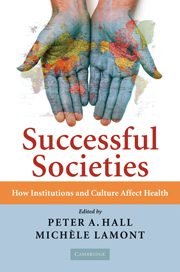Crossref Citations
This Book has been
cited by the following publications. This list is generated based on data provided by Crossref.
Keating, Daniel P.
2010.
Nature and Nurture in Early Child Development.
p.
245.
Dill, Brian
2010.
Community-Based Organizations (CBOs) and Norms of Participation in Tanzania: Working against the Grain.
African Studies Review,
Vol. 53,
Issue. 2,
p.
23.
2010.
Publications Received.
Contemporary Sociology: A Journal of Reviews,
Vol. 39,
Issue. 1,
p.
111.
Lamont, Michèle
and
Small, Mario Luis
2010.
Cultural diversity and anti‐poverty policy.
International Social Science Journal,
Vol. 61,
Issue. 199,
p.
169.
Small, Mario Luis
Harding, David J.
and
Lamont, Michèle
2010.
Reconsidering Culture and Poverty.
The ANNALS of the American Academy of Political and Social Science,
Vol. 629,
Issue. 1,
p.
6.
2010.
Books Received.
Current Anthropology,
Vol. 51,
Issue. 1,
p.
154.
Plaut, Victoria C.
2010.
Diversity Science: Who Needs It?.
Psychological Inquiry,
Vol. 21,
Issue. 2,
p.
168.
Rosenbaum, Mark S.
and
Smallwood, Jillian A.
2011.
Cancer resource centres: Transformational services and restorative servicescapes.
Journal of Marketing Management,
Vol. 27,
Issue. 13-14,
p.
1404.
Crockett, David
Anderson, Laurel
Bone, Sterling A.
Roy, Abhijit
Wang, Jeff Jianfeng
and
Coble, Garrett
2011.
Immigration, Culture, and Ethnicity in Transformative Consumer Research.
Journal of Public Policy & Marketing,
Vol. 30,
Issue. 1,
p.
47.
Holmberg, Sören
and
Rothstein, Bo
2011.
Dying of corruption.
Health Economics, Policy and Law,
Vol. 6,
Issue. 4,
p.
529.
Wray, Matt
Colen, Cynthia
and
Pescosolido, Bernice
2011.
The Sociology of Suicide.
Annual Review of Sociology,
Vol. 37,
Issue. 1,
p.
505.
McDaniel, Susan
and
Bernard, Paul
2011.
Life Course as a Policy Lens: Challenges and Opportunities.
Canadian Public Policy,
Vol. 37,
Issue. Supplement 1,
p.
S1.
Fleming, Crystal M.
Lamont, Michèle
and
Welburn, Jessica S.
2012.
African Americans respond to stigmatization: the meanings and salience of confronting, deflecting conflict, educating the ignorant and ‘managing the self’.
Ethnic and Racial Studies,
Vol. 35,
Issue. 3,
p.
400.
Thomas, Dafydd
2012.
From Public Health to Wellbeing.
p.
128.
Kippax, Susan
Stephenson, Niamh
Parker, Richard G.
and
Aggleton, Peter
2013.
Between Individual Agency and Structure in HIV Prevention: Understanding the Middle Ground of Social Practice.
American Journal of Public Health,
Vol. 103,
Issue. 8,
p.
1367.
Taylor, Rosemary C.R.
2013.
Pandemics and Emerging Infectious Diseases.
p.
72.
Gore, Radhika
2013.
Behind the beautiful forevers: Life, death and hope in a Mumbai undercity.
Global Public Health,
Vol. 8,
Issue. 3,
p.
357.
Stroope, Samuel
Draper, Scott
and
Whitehead, Andrew L.
2013.
Images of a Loving God and Sense of Meaning in Life.
Social Indicators Research,
Vol. 111,
Issue. 1,
p.
25.
Pop, Ioana Andreea
van Ingen, Erik
and
van Oorschot, Wim
2013.
Inequality, Wealth and Health: Is Decreasing Income Inequality the Key to Create Healthier Societies?.
Social Indicators Research,
Vol. 113,
Issue. 3,
p.
1025.
Hall, Peter A.
and
Lamont, Michèle
2013.
Why Social Relations Matter for Politics and Successful Societies.
Annual Review of Political Science,
Vol. 16,
Issue. 1,
p.
49.





